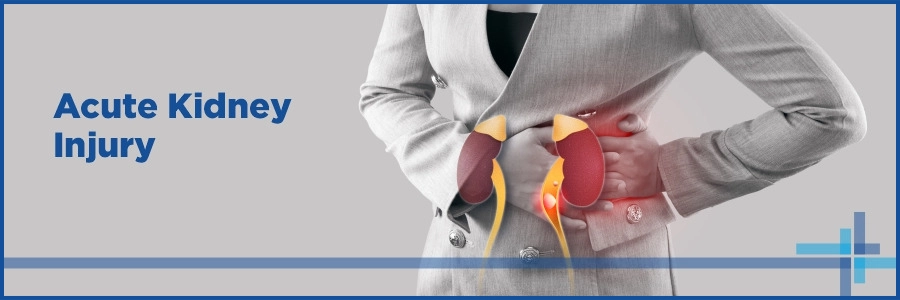- Cardiology 84
- Dermatology 45
- Endocrinology 33
- ENT 16
- Fertility 190
- Gastroenterology 78
- General-Medicine 81
- Gynecology 80
- Hematology 19
- Infectious-Diseases 33
- Neurology 52
- Oncology 34
- Ophthalmology 23
- Orthopedics 69
- Pediatrics 31
- Procedure 23
- Public-Health 144
- Pulmonology 59
- Radiology 8
- Urology 68
- Wellness 161
- Woman-and-child 77

What is Acute Kidney Injury?
Acute kidney injury will happen when the kidneys suddenly lose their ability to eliminate excess salts, fluids, and waste materials from the blood. This elimination is the core of your kidneys’ main function. Body fluids can rise to dangerous levels when kidneys lose their filtering ability.
Be sure to remember this: Acute kidney injury, also known as acute renal injury, can result in the accumulation of electrolytes and waste material in the body, posing a life-threatening risk.
Seeking a second opinion from a nephrologist is advised. This condition is common in hospitalized individuals and can develop rapidly over hours or days to weeks, especially in critically ill patients requiring intensive care.
Causes for Acute Kidney Injury
Acute kidney injury can occur for many reasons. Among the most common reasons are:
- Acute tubular necrosis (ATN)
- Severe or sudden Dehydration
- Toxic kidney injury from poisons or certain medications
- Autoimmune kidney diseases
- Urinary tract obstruction.
Reduced blood flow can damage the kidneys. The conditions that lead to a decrease the blood flow to the kidneys are as follows:
Secure your health with a second opinion. Make informed decisions and book your appointment today!
Get A Second Opinion- Low blood pressure
- Burns
- Dehydration
- Hemorrhage
- Injury
- Septic shock
- Serious illness
- Surgery
Some infections, such as septicemia and acute pyelonephritis, can directly injure your kidneys.
Pregnancy can also cause complications that harm the kidneys, including placenta previa and placenta abruption.
Symptoms of Acute Kidney Injury
The symptoms of acute kidney injury include:
- Bloody stools
- Breath odour
- Slow, sluggish movements
- Generalized swelling or fluid retention
- Fatigue
- Pain between ribs and hips
- Hand tremor
- Bruising easily
- Changes in mental status or mood, especially if you’re older
- Decreased appetite
- Decreased sensation
- Prolonged bleeding
- Seizures
- Vomiting
- High blood pressure
- A metallic taste in your mouth
Risk Factors for Acute Kidney Injury
The chance of acquiring acute kidney injury is greater than in an older person or might have the following long-term health problems like:
- Kidney disease
- Liver disease
- Diabetes, especially if it’s not well controlled
- High blood pressure
- Heart injury
- Morbid obesity
Ready to take control of your health journey? Book your appointment now and start your path towards wellness today!
Book an AppointmentDiagnosis
If you have acute kidney injury, you may have generalized swelling. The swelling is caused by fluid retention. Using a stethoscope, your doctor may hear crackling in the lungs. These sounds can signal fluid retention.
Results of laboratory tests may also show abnormal values, which are new and different from baseline levels. Some of these tests include:
- Blood Urea Nitrogen (BUN)
- Serum Potassium
- Serum Sodium
- Estimated Glomerular Filtration Rate (Egfr)
- Urine analysis
- Creatinine Clearance
- Serum Creatinine
An ultrasound is the preferred method for diagnosing acute kidney injury. However, abdominal X-ray, CT scan, and MRI can also help the doctor determine if there is a blockage in the urinary tract.
Citations
Acute Kidney Injury - StatPearls - NCBI BookshelfFrequently Asked Questions
There are three major causes of acute kidney injury:
- A sudden and significant decrease in blood flow to the kidneys.
- Blood flow to the kidneys can be reduced by excessive blood loss, an injury, or a severe infection known as sepsis.
- Some medicines, poisons, or infections can cause harm.
- A sudden blockage that prevents urine from draining from the kidneys.
The median time to recovery for patients with AKI-related kidney failure was 2 months (interquartile range, 1.2–3.5), with 95 percent recovering within 12 months.
Tiredness, a lack of energy or difficulty concentrating, difficulty sleeping, dry and itchy skin, a desire to urinate more frequently, blood in your urine, foamy urine, and persistent puffiness around your eyes are all symptoms of kidney disease.
Yes, severe or repeated episodes of acute kidney failure can increase the risk of developing chronic kidney disease over time.
Preventive measures include staying hydrated, managing chronic conditions (like diabetes and hypertension), avoiding nephrotoxic medications, and obtaining quick medical attention for illnesses that could impair kidney function, such as infections.

- Cardiology 2132
- Dermatology 168
- Endocrinology 135
- ENT 97
- Fertility 217
- Gastroenterology 232
- General 478
- General-Medicine 1685
- Gynecology 169
- Hematology 85
- Infectious-Diseases 208
- Neurology 207
- Oncology 345
- Ophthalmology 65
- Orthopedics 187
- Pediatrics 83
- Procedure 72
- Public-Health 209
- Pulmonology 126
- Radiology 13
- Second Opinion 311
- Urology 294
- Wellness 600
- Woman-and-child 447
- Others 10217
Related Blogs
If you have any questions, please fill out the enquiry form or call us, and we will get back to you promptly.
040-68334455